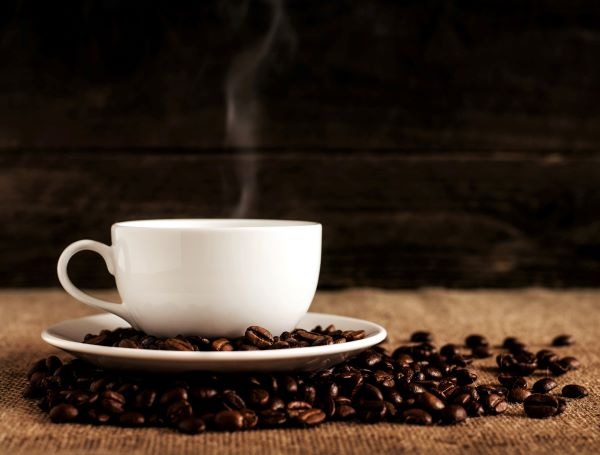Today I want to talk to you about everybody’s favorite crutch for better performance; caffeine. We all know it wakes us up and keeps us alert, but does caffeine help with focus?
This can be a controversial topic sometimes because most people are aware that caffeine is a stimulant, and it can be mildly addictive.
Even so, caffeine is the most widely used nootropic in the world, with approximately 85% of the global population consuming it every day.
That’s one of the reasons I usually avoid recommending nootropic supplements that already contain caffeine.
I have to assume that most of my readers will put caffeine into their system on their own without using a nootropic supplement.
That being said, people continue to drink coffee and tea every day.
Despite the potential downfalls, caffeine just works…
Caffeine Benefits – What are the “Perks”?
The first thing you notice when you have a cup of coffee in the morning is that you feel more awake, and your outlook on life seems a bit brighter.
But what are some of the other advantages?

These are the “Perks” of caffeine consumption:
- Enhances Alertness
- Speeds up Reaction Times
- Improves Memory
- Stabilizes Mood
- Elevates Athletic Performance
- Wards off Fatigue
With this long list of positive effects, it’s no wonder everyone is in love with their morning cup of whatever.
But let’s dig a bit deeper. How does caffeine accomplish all of this?
Caffeine for Brain Function – The Inner Workings
The brain has its’ own mechanisms to ensure that we get tired at the end of the day. One of those mechanisms is the hormone adenosine.
Adenosine blocks neuroreceptors in the brain from reacting to the presence of acetylcholine, epinephrine, and dopamine.

Caffeine stops adenosine from blocking the effectiveness of these neurotransmitters, resulting in greater wakefulness.
Melatonin levels also increase gradually throughout the day, ensuring that we’re ready for ‘Beddy-Bye’ when the stars comes out.
Caffeine prevents this gradual build up, again resulting in greater alertness.
This is also why ingesting caffeine later in the day can cause insomnia. It alters your circadian rhythm.
Fortunately, the effects of caffeine start to wear off at around the 4 to 6 hour mark.
Caffeine for Memory – Can it Help?
This is a little known fact, but caffeine can actually improve your memory.
It does so by encouraging more production of Brain-Derived Neurotrophic Factor(BDNF).

Raising BDNF levels promotes nerve tissue repair as well as improving receptor site efficiency. This increase in neuroplasticity results in better recall.
Reaction times and focus also see improvement with higher levels of BDNF, as well as the ability to multitask.
This is why all of those yuppy go-getters at the office are guzzling caffeine like it’s going out of style.
Caffeine for Depression – The Ultimate Mood Booster?
Natures’ happy pill is the neurotransmitter dopamine, and as I already mentioned, caffeine increases the efficiency of dopamine use in the brain.
So naturally, taking caffeine makes us feel good.

How good? Studies have shown that caffeine consumption can reduce the risk of suicide by up to 50%.
That’s pretty significant if you ask me!
Caffeine also enhances the effects of antidepressants, again by increasing the efficiency of dopamine function.
Caffeine Dosage – Where’s the Safe Zone?
Dosage recommendations usually range from 200-400 mg per day.
The Center for Disease Control & Prevention(CDC) recommends a low to moderate dose for optimal effect.
In practical terms, this is about 2 or 3 cups of coffee a day. If you’re having 4 or 5 cups a day, you’re pushing the upper limit at about 400-500 mg a day.

It’s also worth noting that you can build up a tolerance to caffeine with regular use, so it becomes easier and easier to jump over that line over time.
Caffeine Side Effects – Is your Spine Vibrating?
I’ve made this mistake myself many times. You’re not the only one, so don’t feel bad.
Chugging too many Red Bulls, or overdosing on coffee throughout the day is a common experience for a lot of people.
However, it’s not fun, and we want to avoid it if we can.
Just so you’re aware of what can happen if you go too far, these are the symptoms of caffeine toxicity:
- Irregular Heartbeat
- Nausea
- Shakiness
- Confusion
- Panic Attack
The reason I try to recommend nootropic supplements that are caffeine-free is that supplements with caffeine have the greatest risk of misuse.

They have a much higher concentration of caffeine than would be present in most other beverages. Energy drinks also present a notable danger.
The worst that can happen with caffeine overdose is the user experiencing ventricular fibrillation, when the lower chambers of the heart vibrate instead of contracting properly.
The easiest way to treat symptoms of caffeine toxicity is to drink plenty of water.
Activated charcoal can also be eaten to prevent the absorption of caffeine in the stomach.
That being said, people getting their caffeine through food and drink are typically not going to overdose.
You have to chug a lot of Joe to get caffeine toxicity.
Rushing to the bathroom every 5 minutes should also serve as a preventative.
Does Caffeine Help with Focus?
If you’re a student about to pull an all-nighter, or a working professional that needs to stay on the ball, you could consider using caffeine with some L-Theanine.
L-Theanine is best known for promoting a state of relaxed focus and concentration.
It sounds like a chemical, but it’s actually a natural compound that’s usually extracted from tea.
Caffeine and L-Theanine together are a good, simple nootropic stack that get used by neuro-hackers all the time.

This is how it works; L-Theanine can curb the edginess that comes with caffeine, because of its’ natural calming effect on the nervous system.
At the same time, caffeine can provide more physical endurance and alertness than L-Theanine could by itself.
Research has shown that the magic formula is a 2 to 1 ratio for maximum effect.
I also need to warn you; caffeine consumption can be a two-edged sword.
Caffeine will boost performance as the dosage goes up, but this effect has a ceiling.
Once the beneficial effects of caffeine plateau, performance actually starts to decline. This is mainly due to dehydration.
Caffeine is a diuretic, which is a fancy way of saying that it makes us run to the washroom.
When this happens, B-vitamins are also flushed out of our system.
B-vitamins play several key roles as catalysts for energy metabolism in the body.
The takeaway here is that too much caffeine will actually slow you down.
That being said, caffeine can be a great energy booster if used in moderation.
But should we consider it a cognitive enhancer?
Is Caffeine a Nootropic? – The Final Word
So does caffeine help with focus? Memory? Mood? Can we consider it a legitimate nootropic?
Yes, I think so.
Caffeine is here to stay. It’s popularity stems from the many benefits it provides us with, and the fact that it is readily available.
Or is it readily available now because of its’ many benefits?
Let’s not get into that old, “What came first, the chicken or the egg?”, argument shall we?
The important thing to note is that consuming caffeine is completely fine as long as you don’t go overboard.
You can minimize any risk by being cautious when using concentrated forms like supplements or energy drinks.

I mentioned the recommended dosages so that if you DO take a nootropic supplement with caffeine in it, you can read the label and have a good idea of HOW MUCH is TOO MUCH.
I sincerely hope you found this article helpful, and if you have any questions, please post them below.
I’ll get right back to you. Pinky swear!
In my next post, I’ll be writing a review about ashwagandha as a stress protector.
Until next time,
Michael
P.S. – Still not sure how much caffeine is in your daily cup of whatever? Post a comment below, and I’ll help you figure it out.
Cheers!

Great article Michael. You did your research!
I will definitely be coming back to your site for more information. Thank you for sharing.
Dolly
Thank you Dolly!
If you have any questions at all, please let me know. I am here to help.
Michael
I’m surprised to hear that caffeine as a nootropic is controversial, as it seems like a great case for a classic example. There are some side effects to be aware of, but in smaller amounts, like what is in a normal cup of tea or coffee, it’s a fairly safe addition to any diet. It’s great to see more detail on the benefits of a bit of caffeine – thanks for pairing this information along with symptoms of having too much caffeine as well.
Hi Aly,
Thanks so much for reading my article.
You might be interested in reading my other article about L-Theanine. A lot of neurohackers take L-Theanine with their coffee because it gives them a boost, but without the usual jitters you get sometimes with caffeine on its’ own.
If you do read it, please let me know if you have any questions, and I’ll be happy to help!
Michael
Hello Michael,
I have been using caffeine based products for work, and they have worked very well for me so far…are there any side effects to using caffeine as a nootropic? You mentioned the possibility of caffeine toxicity, or even a caffeine overdose in your article.
Are there better ways to use caffeine as a nootropic? Specifically for performance at work?
Thanks!
Hi Sophia,
Thank you for reading my article.
What you need to realize about caffeine is that it’s a two-edged sword. When you first start taking caffeine, it will boost your energy and alertness level. However, you will peak at a certain point, and the more caffeine you take, the harder you will crash.
A part of the reason why is that caffeine is a diuretic; it makes your body flush out all of its’ fluids. When this happens, you lose a lot of water soluble vitamins in your urine, including B-Complex vitamins. B vitamins act as catalysts in the body to facilitate the metabolism of glucose for energy.
So when you are taking too much caffeine, you are becoming dehydrated, and your energy level starts to decline once you go over that performance peak.
I highly recommend that you read my article on L-Theanine for social anxiety. I know it sounds unrelated, but in that article, I explain how taking L-Theanine and caffeine together will give you more energy with less risk of crashing. It’s a very popular combination among neurohackers.
There are even recommendations in that article for a few supplements you can try that will likely be much more effective than whatever you are using now.
I hope you can make the time to read it. If you have any questions later, please just post another comment here, and I’ll get right back to you.
Michael
Hi Michael,
Reading this article has taught me that among other things, caffeine is very useful as a nootropic.
I never knew that caffeine enhances focus, Improves memory, and even stabilizes mood. There are also the commonly understood benefits of heightened awareness, and more physical endurance.
So many people need to learn from this! Thank you very much for this post.
Hi Smoochi,
Thanks so much for reading my article. I’m glad you found it so informative!
Feel free to use the sharing buttons on my site to forward my article to friends you think would enjoy reading it.
Sharing is caring!
Michael
Hi,
Thanks for sharing this article.
I started using caffeine some time ago for school, and it actually helped me, but right now I’m having trouble sleeping.
I don’t know if it’s a side effect of the caffeine, but I hope not. The caffeine helps me study, and I can get so much more done now. What do you think?
I really need solution.
Hey Betie,
Thank you for reading my article. I really appreciate it.
I’m sorry to hear you are having trouble sleeping. A typical cup of coffee will have just over 100 mg of caffeine in it, and the effects should wear off in about 6 hours.
It’s generally a bad idea to be taking more than 600 mg of caffeine a day. 500 mg a day or less is better, and 200-300mg/day is the best.
I don’t know how much caffeine is in the supplement you are taking right now, but you should avoid taking it too late in the day. Timing is everything.
If you want a supplement for studying, I recommend Performance Lab Stim. It has Caffeine and L-Theanine in it, and is engineered to give you long lasting energy.
L-Theanine allows you to focus, but relaxes you at the same time. It also takes the edginess off the caffeine, and allows you to sleep later.
Caffeine & L-Theanine taken together is a very popular nootropic stack, especially with students.
You should check out my article on L-Theanine. It has more detail than I can give you in the comments box.
I hope that helps.
If you have any more questions, just comment here again, and I’ll get back to you.
Michael